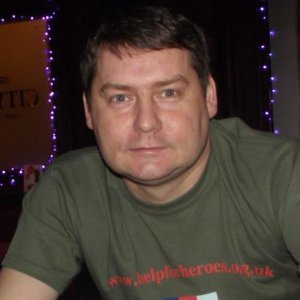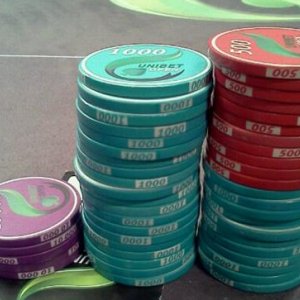Phil Laak Poker Endurance Record Broken by Five Hours

 In May, PocketFives published a feature article about Manchester, U.K. poker player Barry Denson gunning for Phil Laak’s poker endurance record. Denson (pictured) attempted the feat last month and wound up playing for 120 hours and 20 minutes, although he must still verify the feat with Guinness. Whereas Laak played cash games at the Bellagio in Las Vegas for 115 hours back in 2010, Denson’s feat was slightly different. The Brit played in a tournament that awarded 10,000 in starting chips and had 1/2 fixed blinds. The attempt took place between July 1 and July 5.
In May, PocketFives published a feature article about Manchester, U.K. poker player Barry Denson gunning for Phil Laak’s poker endurance record. Denson (pictured) attempted the feat last month and wound up playing for 120 hours and 20 minutes, although he must still verify the feat with Guinness. Whereas Laak played cash games at the Bellagio in Las Vegas for 115 hours back in 2010, Denson’s feat was slightly different. The Brit played in a tournament that awarded 10,000 in starting chips and had 1/2 fixed blinds. The attempt took place between July 1 and July 5.
No Guinness representative was present, but Denson told PocketFives in an exclusive interview that he has 120 hours of video, a pile of paperwork, and documentation of hands played to support his claim. He completed the feat at the G Casino in Manchester, but unlike Laak’s attempt, no real money was at stake. When a player would get up from Denson’s single-table sit and go, a new player would sit down and assume their stack.
Denson told PocketFives that the feat will “take a few weeks to get verified.”
On why he opted for a sit and go, as opposed to a cash game like Laak competed in, Denson explained that a lack of traffic at the G Casino was to blame: “I was trying to get as many people to play against as possible. I didn’t want to put restrictions on people by saying you had to buy in for a certain amount of money or something like that. In a small regional casino in Manchester, it’s difficult to get that many people to come. I wanted to make it as attractive as possible.”
 Why would anyone voluntarily play poker for 120 hours, the equivalent of five straight days? Why was breaking Laak’s mark appealing at all? Denson pointed out, “When I heard about Phil Laak (pictured during attempt) breaking the record in 2010, I was chatting in a poker room with some friends saying we should try to break that. That chatter went on for about six months and eventually I thought I should seriously do it.”
Why would anyone voluntarily play poker for 120 hours, the equivalent of five straight days? Why was breaking Laak’s mark appealing at all? Denson pointed out, “When I heard about Phil Laak (pictured during attempt) breaking the record in 2010, I was chatting in a poker room with some friends saying we should try to break that. That chatter went on for about six months and eventually I thought I should seriously do it.”
Five-minute breaks are allowed every hour and can be banked as needed to give would-be record-breakers a longer respite from the game. We asked Denson how he prepared for a major test of endurance: “The main thing I did was reduce my nighttime sleep. I was going to bed later and getting up earlier. By the time the record came around, I was getting about three hours a night.”
Besides adjusting to little sleep, Denson became more resilient: “Improving my stamina and improving my endurance were important. During the record, I avoided all stimulants like caffeine, Red Bull, alcohol, and sugar. I drank ice water, ate carb-loaded foods, and tried to keep my food as natural as possible. The last thing I wanted to do was drink a load of caffeine and then just crash.”
A group of poker players in Austria supposedly broke Laak’s record a few weeks after “The Unabomber” completed his feat in Nevada, but to our knowledge, Guinness never verified it. Paul Zimbler famously set the mark in 2009 at 75 hours and others have contemplated a run at the title over the years.
Members of the poker community may be quick to point out that a no-risk tournament format is far different from a cash game where real money is at stake. “I’m happy to break the record like I did,” Denson contended. “If I were somewhere else with more players, I would have done a cash game. All of the players in the casino who came and played considered it to be a valid record and a great achievement.”
Denson explained that having a Guinness representative on-hand to verify the event would have cost him a minimum of $4,000. Then, he would have still been subject to the same volume of paperwork as if no Guinness official were present: “I followed all of Guinness’ rules. They sent me a large document that outlined every rule and stipulation they wanted me to follow. I have 120 hours of video to send them. I have no doubts they’ll validate it.”
 As we said before, would-be record-setters are allowed five-minute breaks every hour. Denson gave us his approach to the short hiatuses: “I wanted to go for as long as I could without a break. Then, I would take a quick 30-minute break, go relax somewhere, and then head straight back to the table. I tried to keep a structure and a rhythm to it rather than just have random breaks here and there.”
As we said before, would-be record-setters are allowed five-minute breaks every hour. Denson gave us his approach to the short hiatuses: “I wanted to go for as long as I could without a break. Then, I would take a quick 30-minute break, go relax somewhere, and then head straight back to the table. I tried to keep a structure and a rhythm to it rather than just have random breaks here and there.”
Being awake for five straight days is bound to have an adverse impact on a person’s body. For Denson, 120 hours ended with him sleeping for 12 hours followed by a “normal day” followed by another 12 hours in bed. He added that he was back to his regular routine by July 9, which was four days after his feat came to an end.
With that in mind, can any member of the poker community gun for a poker endurance record? Could a person stop reading this article, head to their casino, and play for a week straight? “It takes a certain type of person with a certain type of attitude,” Denson asserted. “I’m a former solider, so I’m used to being awake. I also have a determination to get things done. Attitude and personality are qualities you need to succeed.”
In terms of publicity for Denson’s achievement, the United Kingdom poker community member reached out to the poker press and a few local radio stations came down to the casino to report. The casino’s public relations department was also on-hand to promote the occasion.
We’ll keep you posted on the latest.




